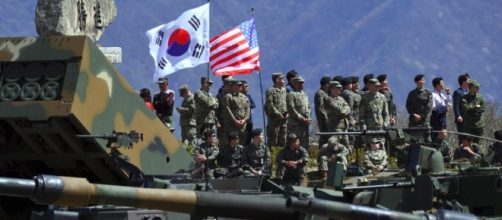The U.S. Eight Army is armed and ready for combat operations in Korea, according to Lt. Gen. Thomas S. Vandal, commanding officer in the Asia-Pacific region. The Eight Army is poised and ready to assist the South Korean army with any eventuality that may happen as the Korean crisis continues.
How will the U.S. army help South Korea defend itself?
Lt. Gen. Vandal is not only the commanding officer of the Eight Army, he is also part of the Chiefs of staff of the South Korean military. He is part of the combined commands of the U.S. and the ROK -- Republic of Korea.
On May 24, the U.S. combined forces command assured the South Korean government that the United States will be ready to assist the Korean army, help it improve and become a fighting force stronger than North Korea -- on par with China and Russia in terms of military technology.
In the event of war, the Eight Army is to be a combined ground component command, though the finalization of this is set for 2018. The integration aims to involve both headquarters of the two countries, focusing on the elimination and destruction of weapons of mass destruction. Through constant drills and military exercise, the South Korean army is one of the most well-trained forces in all of Asia.
How will other countries like North Korea and China react to American support of S. Korea?
China, which is North Korea's solitary regional ally, is not happy with the level of U.S. presence in the Korean peninsula. Beijing argues that the continued increase of U.S. military personnel in the peninsula might force the unstable North Korean dictator to resort to preemptive attacks. China also warns the United States not to overwhelm this Asian region with its military presence.
American presence in the East and South China Sea is a cause for concern for Beijing as it radically affects their interests in the region. China wants to claim what they say are traditional territories in the East and South China Sea, which almost cover the entire region.
This eventuality is a direct violation of international law, which the United States upholds. This is a hindrance to Chinese expansionist policy in Asia.
Aside from South Korea, the U.S. Military is also supplying Taiwan with arms, which Beijing condemns. Also, the Pentagon is warming up to countries like Thailand, where deals might be made such as a mutual defense agreement that may be directed against Chinese expansion. These are some of the things that China will have to contend with as the U.S. presence in Asia continues to grow.


